
China’s anti-spying expansion threatens US businesses, travelers: State Dept
Aug 03, 2023
By Ray Bogan (Anchor/Reporter), Ben Burke (Digital Producer), Chris Field (Senior Editor)
Media Landscape
This story is a Media Miss by the right as only 0% of the coverage is from right leaning media.
Learn more about this dataLeft 50%
Center 50%
Right 0%
Bias Distribution
Far
Left
+0
Click to close
Left
+0
Click to close
Lean
Right
+0
Click to close
Right
+0
Click to close
Far
Right
+0
Click to close
3 other sources covering this story
Total News Sources
3
Leaning Left
1
Center
1
Leaning Right
0
Last Updated
9 months ago
The United States raised concerns this week over China’s efforts to encourage its citizens to participate in a new counter-espionage push. The U.S. Department said Wednesday, Aug. 2, that it is closely monitoring how the Communist nation is enacting its a new anti-spying expansion law.
China’s current so-called counter-espionage expansion efforts include a new push to mobilize its entire population to fight suspicious activity, according to Reuters, and to spy on each other. The Ministry of State Security said this week that it is creating channels for citizens to report any activity they find suspicious and that its will offer commendations and rewards for those who participate.
Unbiased news.
Directly to your inbox. Free!
Learn more about our emails. Unsubscribe anytime.
By entering your email, you agree to the Terms & Conditions and acknowledge the Privacy Policy.
The U.S. has been concerned this summer about China’s efforts to expand its counter-espionage rules, including a law that took effect in July banning the sharing of unspecified “information related to national security and interests,” Reuters reported.
American leaders are worried that the vagueness of the expanded definition of espionage will give Communist authorities too much leeway for implementing national security laws and will give the CCP cover to access information and data sitting on personal property.
U.S. officials warned that American and other foreign-owned companies working in China could be caught up in the new rules and punished just for doing business, and noted that Americans in China could be at risk for “arbitrary arrest and detention.”
China’s Ministry of State Security has repeatedly defended the anti-spying expansion as a requirement for national security and has urged its people to buy in.
“National security is the foundation of national rejuvenation, and social stability is the prerequisite for national prosperity,” the agency posted on WeChat, according to a Google translation of the post.
“Espionage is a highly concealed, professional, and harmful serious illegal and criminal act,” the ministry added. “It not only requires the national security organs to play the role of specialized counter-espionage agencies, but also requires the extensive participation of the people and joint prevention.”
The new law “is all for the people” and “depends on the people,” the CPP said, adding that it was relying on the people to be part of the anti-spying program and that they would be protected and rewarded for their efforts.
“It is required that ‘national security organs must rely on the support of the people in counter-espionage work, mobilize and organize the people to prevent and stop espionage activities,'” the ministry wrote. “In terms of rights protection, it is clear that ‘the state shall protect individuals and organizations that support and assist in counter-espionage work’ [and] ‘[r]ecognize and reward individuals and organizations that report espionage or make significant contributions to counter-espionage work.'”
The CCP is going to make sure the populace is clear on its anti-spying efforts by pushing the plan in schools, news, and cultural messaging.
“[P]eople’s governments at all levels and relevant departments should organize anti-espionage security prevention publicity and education, incorporate anti-espionage security prevention knowledge into education, training, and law popularization content, and enhance the entire people’s anti-espionage security awareness and national security literacy,” the government said. “[N]ews, broadcasting, units such as television, cultural, and Internet information services should carry out targeted anti-espionage publicity and education for the entire society.”
U.S. State Department spokesman Matt Miller reiterated the Biden administration’s ongoing concerns with China’s expanded counter-espionage laws.
“We do have concerns over it, certainly encouraging citizens to spy on each other is something that’s of great concern,” Miller told reporters. “We are closely monitoring the implementation of China’s new counter-espionage law as we have been, which as written greatly expands the scope of what activities are considered espionage.”
“In addition to being concerned about these new reports, we remain concerned about the risk of arbitrary arrest and detention in the PRC, as reflected in our Level 3 travel advisory,” Miller said.
Media Landscape
This story is a Media Miss by the right as only 0% of the coverage is from right leaning media.
Learn more about this dataLeft 50%
Center 50%
Right 0%
Bias Distribution
Far
Left
+0
Click to close
Left
+0
Click to close
Lean
Right
+0
Click to close
Right
+0
Click to close
Far
Right
+0
Click to close
3 other sources covering this story
Total News Sources
3
Leaning Left
1
Center
1
Leaning Right
0
Last Updated
9 months ago
Unbiased news.
Directly to
your inbox.
Free!
MOST POPULAR
-
 Getty Images
Getty Images
Pythons decimate Florida’s wildlife, is eating them the answer?
Watch 2:04
Tuesday
-
 Getty Images
Getty Images
Trump could lose Secret Service protection if found guilty
Watch 2:10
Tuesday
-
 AP Images
AP Images
Argentina asks to join NATO as Milei looks to enhance security, strengthen ties
Watch 1:57
Apr 19
-
 Getty Images
Getty Images
Utah students protest 'furries,' school admin deny problem
Watch 2:10
Apr 19
